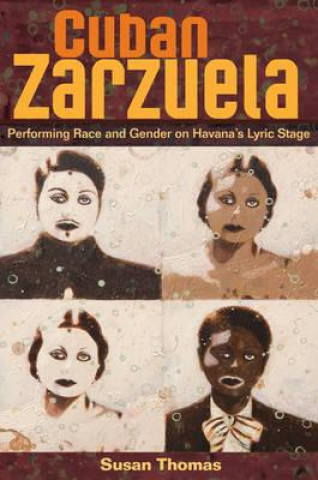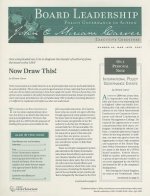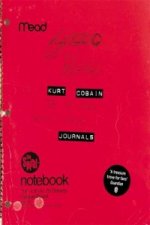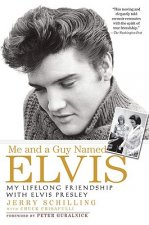
Kód: 04868055
Cuban Zarzuela
Autor Susan Thomas
On September 29, 1927, Cuban soprano Rita Montaner walked onto the stage of Havana's Teatro Regina, her features obscured under a mask of blackened glycerin and her body clad in the tight pants, boots, and riding jacket of a coach ... celý popis
- Jazyk:
 Angličtina
Angličtina - Vazba: Pevná
- Počet stran: 264
Nakladatelství: University of Illinois Press, 2008
- Více informací o knize

1439 Kč
Dostupnost:
50 % šance Máme informaci, že by titul mohl být dostupný. Na základě vaší objednávky se ho pokusíme do 6 týdnů zajistit.
Máme informaci, že by titul mohl být dostupný. Na základě vaší objednávky se ho pokusíme do 6 týdnů zajistit.Prohledáme celý svět
Mohlo by se vám také líbit
-

Rivals
373 Kč -

Communication and the Globalization of Culture
3546 Kč -

Patterns of Distribution of Amphibians
3017 Kč -

Fight for the Bay
1091 Kč -

Board Leadership
1008 Kč -

Tweed Rivers
332 Kč -

Program Music
938 Kč
Darujte tuto knihu ještě dnes
- Objednejte knihu a zvolte Zaslat jako dárek.
- Obratem obdržíte darovací poukaz na knihu, který můžete ihned předat obdarovanému.
- Knihu zašleme na adresu obdarovaného, o nic se nestaráte.
Informovat o naskladnění knihy
Zadejte do formuláře e-mailovou adresu a jakmile knihu naskladníme, zašleme vám o tom zprávu. Pohlídáme vše za vás.
Více informací o knize Cuban Zarzuela
Nákupem získáte 144 bodů
 Anotace knihy
Anotace knihy
On September 29, 1927, Cuban soprano Rita Montaner walked onto the stage of Havana's Teatro Regina, her features obscured under a mask of blackened glycerin and her body clad in the tight pants, boots, and riding jacket of a coachman. Standing alongside a gilded carriage and a live horse, the blackfaced, cross-dressed actress sang the premiere of Eliseo Grenet's tango-congo, "Ay Mama Ines". The crowd went wild. Montaner's performance cemented "Ay Mama Ines" as one of the classics in the Cuban repertoire, but more importantly, the premiere heralded the birth of the Cuban zarzuela, a new genre of music theater that over the next fifteen years transformed popular entertainment on the island. "Cuban Zarzuela: Performing Race and Gender on Havana's Lyric Stage" marks the first comprehensive study of the Cuban zarzuela, a Spanish-language light opera with spoken dialogue that originated in Spain but flourished in Havana during the early twentieth century. Created by musicians and managers to fill a growing demand for family entertainment, the zarzuela evidenced the emerging economic and cultural power of Cuba's white female bourgeoisie to influence the entertainment industry. Susan Thomas explores zarzuela's function as a pedagogical tool, through which composers, librettists, and business managers hoped to control their troupes and audiences by presenting desirable and problematic images of both feminine and masculine identities. Zarzuela was, Thomas explains, "anti-feminist but pro-feminine, its plots focusing on female protagonists and its musical scores showcasing the female voice". Focusing on character types such as the mulata, the negrito, and the ingenue, Thomas uncovers the zarzuela's richly textured relationship to social constructs of race, class, and especially gender.
 Parametry knihy
Parametry knihy
Zařazení knihy Knihy v angličtině The arts Music Music: styles & genres
1439 Kč
- Plný název: Cuban Zarzuela
- Podnázev: Performing Race and Gender on Havana's Lyric Stage
- Autor: Susan Thomas
- Jazyk:
 Angličtina
Angličtina - Vazba: Pevná
- Počet stran: 264
- EAN: 9780252033315
- ID: 04868055
- Nakladatelství: University of Illinois Press
- Hmotnost: 544 g
- Rozměry: 229 × 152 × 25 mm
- Datum vydání: 11. November 2008
Oblíbené z jiného soudku
-

Elvis and Me
218 Kč -

Just Kids
358 Kč -

Complete Preludes, Nocturnes & Waltzes
506 Kč -

The Long Hard Road Out Of Hell
410 Kč -

The Dirt - Mötley Crüe
357 Kč -

Pink Floyd All The Songs
1127 Kč -

Beatles Gear
1284 Kč -

Face the Music
374 Kč -

No One Here Gets Out Alive
253 Kč -

Ocean of Sound
303 Kč -

David Bowie Is
1103 Kč -

Whatever You Say I Am
330 Kč -

Does the Noise in My Head Bother You?
276 Kč -

Lords Of Chaos - 2nd Edition
488 Kč -

Hear It and Sing It!
446 Kč -

Iron Maiden Every Album, Every Song (On Track)
564 Kč -

Bill Evans
513 Kč -

Rachmaninov - Concerto No. 2 in C Minor, Op. 18:
658 Kč -

Study Quran
972 Kč -

Folk Music: A Very Short Introduction
269 Kč -

Confessions Of A Heretic
567 Kč -

Moonwalk
306 Kč -

Beastie Boys Book
804 Kč -

Metalion: The Slayer Mag Diaries
1019 Kč -

Jazz Piano Book
1076 Kč -

Taylor Swift
268 Kč -

White Line Fever
276 Kč -

A Perfect Union of Contrary Things
413 Kč -

I Am Ozzy
358 Kč -

Standing in the Shadows of Motown
951 Kč -

Angry Blonde
303 Kč -

Suzuki Violinist
494 Kč -

Dancing The Dream
670 Kč -

My Friend Michael
432 Kč -

Paul McCartney
420 Kč -

Pink Floyd: Mind Over Matter
952 Kč -

Burning Britain
558 Kč -

Real Book
1125 Kč -

I'm with the Band
347 Kč -

Jazz Theory Book
1420 Kč -

Eric Clapton: The Autobiography
306 Kč -

Kurt Cobain
677 Kč -

Queen Unseen - My Life with the Greatest Rock Band of the 20th Century: Revised and with Added Material
281 Kč -

It's So Easy (and other lies)
306 Kč -

18 and Life on Skid Row
368 Kč -

Only Death Is Real
812 Kč -

Unleashed: The Story of Tool
648 Kč -

Ariana
223 Kč -

Me and a Guy Named Elvis
429 Kč
Osobní odběr Praha, Brno a 12903 dalších
Copyright ©2008-24 nejlevnejsi-knihy.cz Všechna práva vyhrazenaSoukromíCookies


 Vrácení do měsíce
Vrácení do měsíce 571 999 099 (8-15.30h)
571 999 099 (8-15.30h)